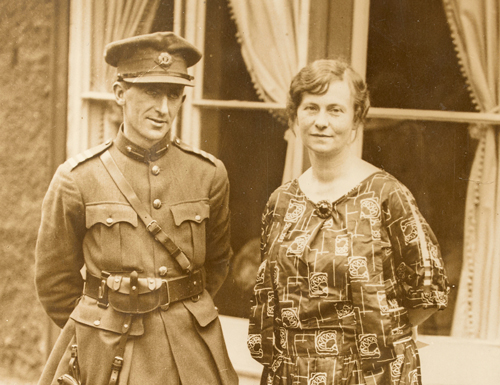Mulcahy sets out conditions for peace as Dáil backs government actions in civil war
Dublin, 13 September 1922 – The new Dáil has voted by a margin of 54 to 15 to approve the action the government has ‘taken, and is taking, to assert and vindicate the authority of the Parliament.’
The motion was proposed yesterday by William Sears, TD for Mayo South-Roscommon South, and followed a debate during which General Richard Mulcahy, Minister for Defence, set out the pre-conditions for peace in Ireland.
According to Mulcahy, there were six essentials for peace:
• that some group representing the people be allowed to put the treaty into effect
• that they be allowed draft and enact the best constitution that they can get under the terms of the treaty
• that violence should not be used as a tool to force any change to the constitution or to the expressed will of the Dáil
• that opposition to the government must be confined to constitutional lines
• that the army must be the people’s army and responsible absolutely to the national government
• that the government shall control by its regulations all the arms held in the country.
General Mulcahy’s list largely echoes the points made the day before by W.T. Cosgrave, newly-elected President of the Provisional Government. Cosgrave told the Dáil that for peace to be made now, it needed to be made on ‘well defined lines’, and it needed to be constitutional. ‘There must not, and will not, be an armed body in the community without the sanction of parliament, and parliament must have control of all arms, and an armed opposition to its will cannot not be permitted.’
‘We demand no concession which cannot be given with honour’, President Cosgrave elaborated. ‘We insist upon the people’s rights… We are willing to come to a peaceful understanding with those in arms but it must be on a definite basis.’
British Pathé newsreel footage of guerilla warfare in Ireland 1922
While the Dáil business has been dominated by the ongoing civil war and possible pathways to peace, it has not been to the exclusion of all other matters.
Darrell Figgis proposed an amendment to William Sears’s motion regretting the failure of the President of the Dáil, on behalf of the government, to outline a constructive policy that took account of the very grave economic perils that people faced, problems which he considered to be at the root of the wider disorder. It was unemployment that had created the Irregulars, Mr Figgis felt.
‘It is not merely that people are fighting for or against a Republic, or people are fighting for or against Document No. 2. Such issues have been cleared, but they are fighting at the present moment because if a nation has once got into a position after war that its citizens are accustomed to the use of arms, and that is followed by a period of unemployment, you at once get these arms used for an irregular purpose. It was so in other countries; it is so in this country... It is not until the Dáil decides to deal directly with the cause as well as with the effect that we will be able to diminish unemployment and so ultimately be able to control irregularism.’
The Labour Party has also highlighted social and economic issues; William O’Brien, TD for Dublin South, reminded his Dáil colleagues that while the labour movement believed in national freedom, it did so not as an end in itself, but as a means to an end. ‘We believe not only in national freedom, but in economic freedom and social freedom, and we believe that national freedom is incomplete unless it also means economic freedom and social freedom.’
Already, the large Labour contingent in the Dáil is making its presence felt; the party leader, Thomas Johnson, called on the chamber to repudiate a statement attributed to the Minister for Home Affairs, Kevin O’Higgins, to the effect that the government did not recognise the right of civil servants to strike.
The issue raised a question, Mr Johnson argued, about the ‘status of the human being in his social relations. The ministry for whom the Minister for Home Affairs speaks in this matter evidently conceives that once a person enters the employment of a government he is not only selling his bodily powers, and mental powers, but he is selling his liberty, selling his soul.’
[Editor's note: This is an article from Century Ireland, a fortnightly online newspaper, written from the perspective of a journalist 100 years ago, based on news reports of the time.]





















